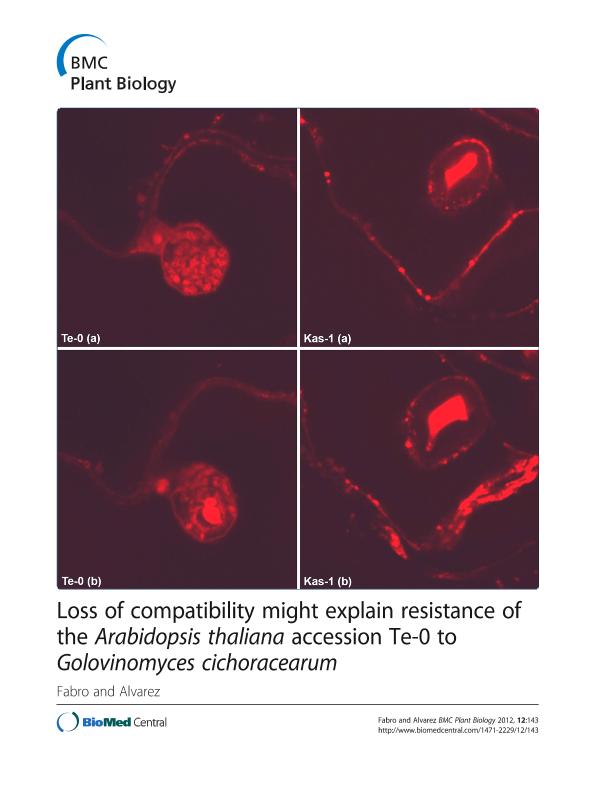Artículo
Loss of compatibility might explain resistance of the Arabidopsis thaliana accession Te-0 to Golovinomyces cichoracearum
Fecha de publicación:
08/2012
Editorial:
BioMed Central
Revista:
BMC Plant Biology
e-ISSN:
1471-2229
Idioma:
Inglés
Tipo de recurso:
Artículo publicado
Clasificación temática:
Resumen
The establishment of compatibility between plants and pathogens requires compliance with various conditions, such as recognition of the right host, suppression of defence mechanisms, and maintenance of an environment allowing pathogen reproduction. To date, most of the plant factors required to sustain compatibility remain unknown, with the few best characterized being those interfering with defence responses. A suitable system to study host compatibility factors is the interaction between Arabidopsis thaliana and the powdery mildew (PM) Golovinomyces cichoracearum. As an obligate biotrophic pathogen, this fungus must establish compatibility in order to perpetuate. In turn, A. thaliana displays natural variation for susceptibility to this invader, with some accessions showing full susceptibility (Col-0), and others monogenic dominant resistance (Kas-1). Interestingly, Te-0, among other accessions, displays recessive partial resistance to this PM.Results: In this study, we characterized the interaction of G. cichoracearum with Te-0 plants to investigate the basis of this plant resistance. We found that Te-0́s incompatibility was not associated with hyper-activation of host inducible defences. Te-0 plants allowed germination of conidia and development of functional haustoria, but could not support the formation of mature conidiophores. Using a suppressive subtractive hybridization technique, we identified plant genes showing differential expression between resistant Te-0 and susceptible Col-0 plants at the fungal pre-conidiation stage.Conclusions: Te-0 resistance is likely caused by loss of host compatibility and not by stimulation of inducible defences. Conidiophores formation is the main constraint for completion of fungal life cycle in Te-0 plants. The system here described allowed the identification of genes proposed as markers for susceptibility to this PM.
Archivos asociados
Licencia
Identificadores
Colecciones
Articulos(CIQUIBIC)
Articulos de CENTRO DE INVEST.EN QCA.BIOL.DE CORDOBA (P)
Articulos de CENTRO DE INVEST.EN QCA.BIOL.DE CORDOBA (P)
Citación
Fabro, Georgina; Alvarez, Maria Elena; Loss of compatibility might explain resistance of the Arabidopsis thaliana accession Te-0 to Golovinomyces cichoracearum; BioMed Central; BMC Plant Biology; 12; 143; 8-2012; 1-14
Compartir
Altmétricas




